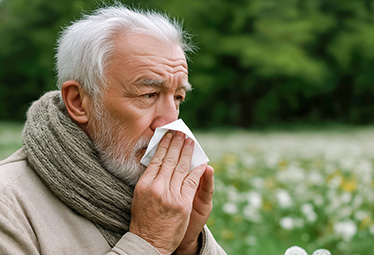 Every year, they come back with a vengeance. Invisible and insidious, pollen causes sneezing, red eyes and coughing fits. More and more people are developing seasonal allergies, even as adults. Why is this happening? Are we all becoming allergic? And how can we protect ourselves? We take a closer look at this public health phenomenon.
Every year, they come back with a vengeance. Invisible and insidious, pollen causes sneezing, red eyes and coughing fits. More and more people are developing seasonal allergies, even as adults. Why is this happening? Are we all becoming allergic? And how can we protect ourselves? We take a closer look at this public health phenomenon.
An explosion of pollen allergies
The figures are staggering: more than 30% of the French population now suffers from respiratory allergies, a percentage that has risen sharply over the past 20 years. And this trend is affecting everyone: children, teenagers, adults and even seniors are affected.
Pollen allergy, or hay fever, mainly occurs in spring and summer, but can also appear in autumn. It is an exaggerated reaction by the immune system to particles that are harmless in themselves: pollen grains produced by trees, grasses and weeds.
Why are we becoming more allergic?
Several factors are behind this sharp increase:
1. Climate change
Rising temperatures and air pollution are prolonging the pollen season and increasing the allergenic potential of pollen. Plants are producing more grains, which travel further and remain in the air for longer.
2. Excessive hygiene
According to the hygiene hypothesis, our increasingly sterile environment prevents our immune system from developing properly. As a result, it overreacts to harmless substances such as pollen.
3. Urban pollution
Fine particles from exhaust fumes alter pollen proteins, making them more aggressive. Some studies show that city dwellers are more affected than rural dwellers.
Classic symptoms of pollen allergy
- Sneezing fits
- Runny or blocked nose
- Red, watery or itchy eyes
- Fatigue, sleep disturbances
- Allergic asthma (in severe cases)
These symptoms can seriously affect quality of life for several weeks or even months.
Once allergic, always allergic?
Not necessarily! It is possible to develop an allergy at any age, but it is also possible to recover from it, at least partially, through desensitisation. However, without treatment or prevention, allergies can worsen over time and develop into asthma.
Pollen calendar
- February–April: Alder, birch, hazel. Common symptoms: eyes, nose
- May–June: Grasses, oak, plane tree. Common symptoms: sneezing, coughing
- July–September: Ragweed (highly allergenic). Common symptoms: asthma, severe rhinitis



